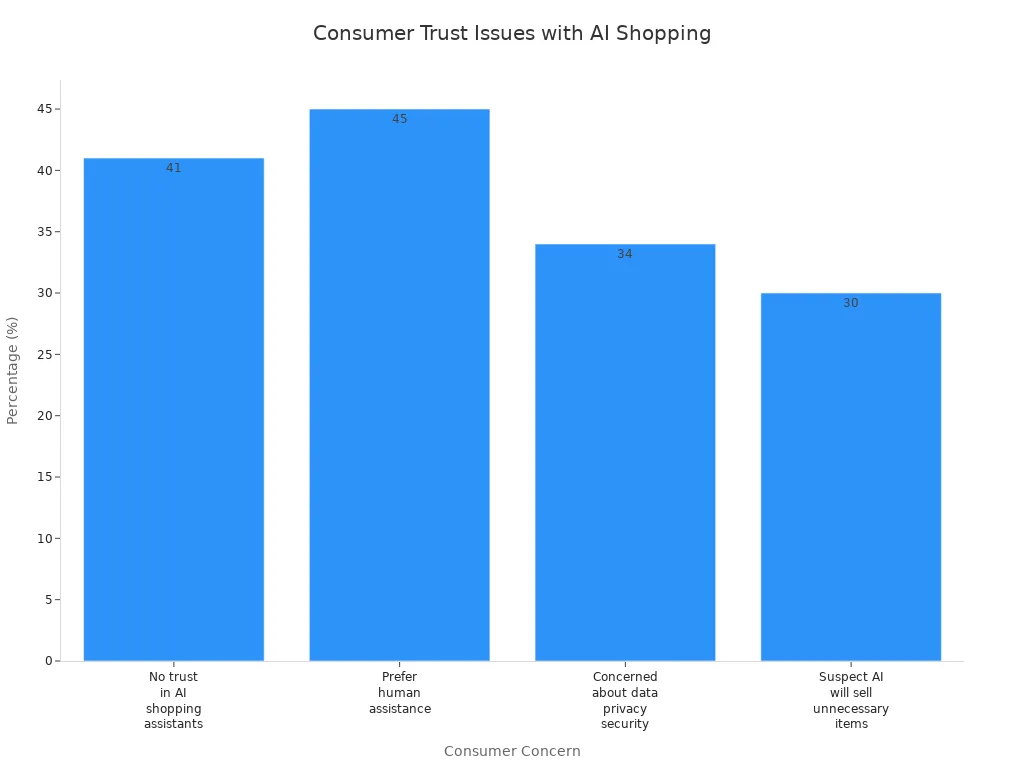Why Consumer Trust Is the Key to Successful AI Retail Experiences

Imagine you walk into a store that knows your favorite snacks. The store suggests new snacks you might like. This can make you feel excited. But you also want your information to be safe. If you trust the store, you will come back many times. Look at these numbers:
Statistic | Description |
|---|---|
Are more likely to buy again if they trust a brand. | |
63% of global consumers | Do not feel sure about AI keeping their data safe. |
25% of consumers | Think stores should use AI for personalization, but only 29% feel they get enough value for their data. |
Consumer trust helps you decide to use AI shopping tools. If you feel safe, you will try new things and have better experiences.
Key Takeaways
Consumer trust is very important for good AI retail experiences. When shoppers trust a brand, they come back more often. They also like to try new things from the brand.
Being open about how AI works helps shoppers feel confident. Brands should tell people how they use data. They should also explain how they make choices to build trust.
Good AI tools make customers happier. Shoppers want correct information and the same service everywhere.
Brands must use data in the right way. They should only collect the data they need. They must keep it safe to help people trust them.
Trust makes people loyal and helps them use AI more. When shoppers feel safe, they use AI tools more. They also tell others about the brand.
Consumer Trust in AI Retail

Why Trust Matters
You probably notice AI everywhere when you shop online. Maybe you see chatbots pop up with answers or get product suggestions that seem to know your style. But do you trust these tools? That question matters more than you might think.
62% of shoppers say they trust AI to help them choose brands.
75% have seen AI recommendations or chatbots while shopping.
Only 44% actually use these features.
Just 45% feel any trust in AI-powered recommendations.
Only 10% trust the first answer from an AI platform.
These numbers show that even though AI is common, many people still feel unsure. You might like the idea of AI making shopping easier, but you want to feel safe and understood first.
Brands that earn your trust can help you feel more confident about using AI tools. When you trust a store, you are more likely to try new features, like smart recommendations or chatbots. This trust can even shape your decisions about what to buy and where to shop.
Personalized suggestions can feel helpful, but only if you believe the AI respects your privacy and gives you real value. If you feel the AI understands your needs, you will probably use it more. When you see that a store protects your data and explains how AI works, you feel more comfortable. This comfort leads to better shopping experiences and stronger loyalty.
Trust Gap and Consumer Behavior
Even though AI is everywhere, a gap remains between what shoppers expect and what they experience. Many people worry about privacy, fairness, and whether AI will really help them.
Statistic | Percentage |
|---|---|
41% | |
Prefer human assistance | 45% |
Concerned about data privacy | 34% |
Suspect AI will sell extra items | 30% |

You might feel more comfortable talking to a real person, especially if you worry about how AI uses your information. Some shoppers think AI might push them to buy things they do not need. Others feel nervous about how much AI knows about them.
Privacy concerns can make you hesitate to use AI features.
Many people want brands to be open about how they use AI and handle data.
Too much reliance on AI, without human help, can make trust drop even more.
Consumer trust drops when you feel that AI is not clear or fair. If you do not trust the AI, you might avoid using chatbots or ignore product suggestions. This trust gap can stop you from enjoying the benefits of AI in retail.
When stores focus on building trust, you feel safer and more willing to try new AI-powered tools. This trust helps you make better choices and enjoy shopping more.
Key Concerns
Data Privacy
You care about how stores use your information. Many shoppers worry about how much data AI collects. You might ask if your favorite store keeps your details safe. You may also wonder if they share your data with others. Here are some things people worry about:
Companies take a lot of personal data when you shop with AI.
Many people do not trust how stores keep this data safe.
Some shoppers think AI systems treat people unfairly or show bias.
A recent survey showed that over half of shoppers in the US, UK, and Australia worry about brands using AI-made content without telling them. This worry is linked to fears about how stores use your information. If you hear about a data breach, you may stop trusting the store. In fact, 69% of shoppers feel uneasy about how companies use their data. Almost one-third have had a security problem after shopping online. Years of privacy problems have made people more careful and less trusting.
Transparency
You want to know how AI makes choices about what you see or buy. When stores explain how AI works, you feel more in control. Transparency helps you understand why you get certain suggestions or prices. Here’s why it matters:
Stores that explain how AI affects prices and suggestions help you feel sure.
Clear explanations about AI can make you trust the technology and the company.
When you know how AI works, you feel smarter and more interested.
Key Point | Explanation |
|---|---|
When you know how AI sets prices and gives suggestions, you trust it more. | |
Education is Key | Learning how AI helps you shop builds trust. |
Anticipating Customer Needs | Early information saves you time and makes you feel important. |
Reliability
You expect AI to work well every time you shop. If a chatbot gives you the wrong answer, you get annoyed. If product info is old, you feel upset. Reliability means you get the right help, no matter where or how you shop.
Consumers say reliability in AI retail means getting correct answers every time. This includes up-to-date product details, prices, and store rules.
When AI works well, you feel happier and more satisfied. Trustworthy and reliable AI shapes your shopping habits and makes your experience better. Consumer trust grows when you know you can count on AI to help you every time.
Building Consumer Trust

Clear Communication
You want stores to talk to you in a way that makes sense. When a brand explains how it uses AI, you feel more comfortable. You like knowing when AI is helping you pick products or set prices. If a store hides how AI works, you might lose trust. Many shoppers say they want clear answers about costs and promotions. You also expect quick replies when you ask questions. Stores that use AI for personalization and customer service can make you feel special. Here are ways retailers build trust through communication:
Show you when AI is in use.
Give you honest details about prices and deals.
Answer your questions fast, whether by chatbot or a real person.
Tip: If you know what’s happening behind the scenes, you feel more confident about trying new AI features.
Ethical Data Practices
You care about how your data gets used. Brands that ask for your permission before collecting information make you feel safe. You want companies to collect only what they need, not everything about you. For example, using your region instead of your exact location helps protect your privacy. Ethical business practices, like fair sourcing and strong data protection, help you trust a brand. When a store matches your values, you feel good about shopping there.
Ask for clear consent before using your data.
Collect only the data needed for your shopping experience.
Protect your information from misuse or leaks.
Note: When you see a brand respect your privacy, you’re more likely to become a loyal customer.
Consistent Experience
You expect the same great service every time you shop, whether you talk to a chatbot or a real person. If AI and human helpers give you different answers, you get confused. Retailers need to make sure your experience feels smooth across all channels. Many shoppers say they lose trust if AI works without telling them. You want to know when AI is helping and that it serves your needs, not just the store’s goals. Mixing AI with human support can make you feel valued and understood.
Keep information and service the same across websites, apps, and stores.
Tell you when AI is involved.
Blend AI tools with human help for a friendly touch.
Callout: A consistent experience builds consumer trust and makes you want to come back.
Benefits of Trust
Loyalty
When you trust a store’s AI, you feel happier and more likely to shop there again. Trust makes you want to return and buy more. Stores that use AI to help you quickly and give you answers that fit your needs make you feel special. You notice when a brand remembers your favorite products or gives you deals that match your interests. This personal touch keeps you coming back.
Here’s how trust leads to loyalty:
Evidence Description | Key Points |
|---|---|
Trust and Customer Happiness | Trust makes you happy, which means you want to buy again. |
Efficiency and Customer Satisfaction | Fast and helpful AI makes you satisfied and loyal. |
Personalized Experiences | AI that understands you builds loyalty by offering what you like. |
If you feel a brand cares about you, you stick with it. That’s why consumer trust is so important for loyalty.
AI Adoption
You try new AI features when you feel safe and respected. Stores that earn your trust see more people using their AI tools. You might use chatbots, smart shopping assistants, or personalized recommendations. When you trust the brand, you feel excited to try these new things.
Trust in brands using AI grew from 29% in 2024 to 33% in 2025.
80% of shoppers want rules to protect their data, showing trust is growing but needs care.
Retailers using AI saw sales jump 2.3 times and profits rise 2.5 times compared to those not using AI.
You help shape the future of shopping when you adopt AI tools. Your trust encourages brands to keep improving their technology.
Brand Reputation
A store’s reputation grows when you trust its AI. You feel good about buying from brands that use AI in a fair and honest way. Trust in AI systems helps you feel safe and builds strong relationships. Brands that focus on transparency and ethical AI stand out in your mind.
Evidence Type | Description |
|---|---|
Positive Perception of AI | Trust in AI makes you more likely to buy and recommend the brand. |
Trust in AI Systems | Builds long-term relationships and lowers your worries about shopping. |
Brand Trust | Reduces risk and leads to repeat purchases. |
AI tools that check contracts for errors make you feel safe.
Brands that use human-centered AI connect with you emotionally.
Companies that share their values and use ethical AI earn your respect.
When you trust a brand’s AI, you help boost its reputation. Your trust makes the brand stronger and more popular.
You play a big part in shaping how stores use AI. Consumer trust helps stores succeed with new technology. Many people feel unsure about AI, especially for shopping, but you trust it more when it helps with returns or loyalty programs. Stores can measure progress by looking at repeat purchases, loyalty sign-ups, and how fast they deliver.
Track how often you come back to shop.
Watch loyalty program growth.
Check delivery and return speed.
Keep asking questions and expect clear answers. When stores listen and improve, you get better experiences.
FAQ
How do you know if a store uses AI responsibly?
Look for clear signs. Stores should tell you when they use AI. They should explain how they use your data. If you see honest answers and easy-to-read privacy policies, you can feel more confident.
What should you do if you worry about your data privacy?
You can check the store’s privacy policy. Ask questions if you feel unsure. Choose brands that let you control your data. If you want, you can opt out of data sharing.
Why does transparency matter in AI shopping?
Transparency helps you understand how AI makes choices. When stores explain how AI works, you feel more in control. You can trust the process and enjoy shopping more.
How can you spot a trustworthy AI-powered brand?
Tip: Trustworthy brands give you clear choices, respect your privacy, and answer your questions quickly. They also let you know when AI is helping you shop.
See Also
The Future of Retail Lies in AI-Driven Stores
Understanding the Growth of AI-Enhanced Corner Shops
Transforming Online Retail Management with AI Tools
Modern Retail Benefits from AI-Enabled Combo Vending Machines
